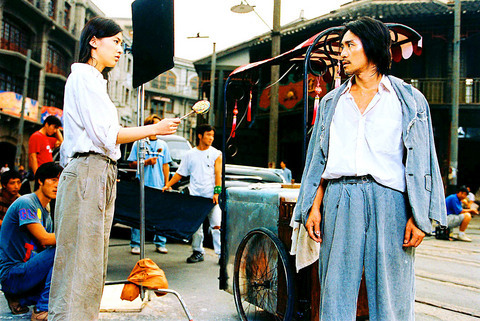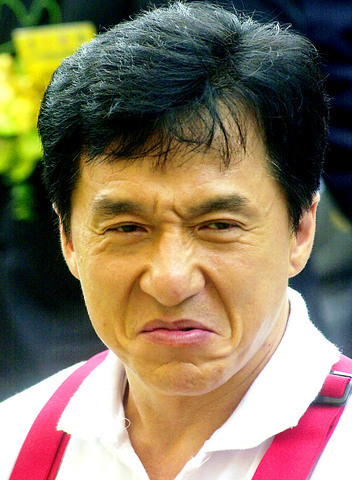The industry that launched Jackie Chan (
Once a powerhouse that churned out 300 movies a year and had box-office takings of more than a billion Hong Kong dollars annually in the mid-1990s, the industry is now just a shade of its past glory.
In 2004, Hong Kong produced a measly 64 features and took HK$445 million (US$57 million) at the box office.

PHOTO:REUTERS
"You can't even call it an industry," said Woody Tsung, chief executive of the Hong Kong, Kowloon & New Territories Motion Picture Industry
Association.
Industry insiders blame video-disc piracy -- widespread in Asia -- and the rise of computer download services for siphoning off profits and spooking movie

PHOTO: AP
investors.
Hong Kong moviemakers are now turning to China's market, co-productions with foreigners and new forms of film financing to try to mount a recovery. They're also pressing the government for better protection of intellectual property.
China recently removed quota restrictions on Hong Kong films under a free-trade deal. But there are just three Chinese distributors authorized to import movies from the territory, making it tough to get a good prices for distribution rights.
"If those three companies don't buy the film, then there's nothing to talk about," Tsung said. "Our bargaining power is much smaller."
While China's market of 1.3 billion potential viewers is mouthwatering, it remains largely untapped, Hong Kong industry official say, because it only has about 2,000 screens and movie watching isn't widespread.
Some analysts say one way to expand the industry may be to form greater ties with mainland China.
Film critic Law Kar envisions an industry that has China providing the backdrops and Hong Kong supplying experienced work crews, business savvy and an established global distribution network.
"The Hong Kong spirit is constantly adapting with flexibility," he said.
Law's vision of an integrated greater-Chinese movie industry has already demonstrated its potential in the Oscar-winning martial arts movie Crouching Tiger, Hidden Dragon (
Crouching Tiger cracked the coveted US market despite its non-English dialogue, grossing more than US$130 million and becoming the most popular foreign-language film in American history.
Breaking into mainstream Western markets is critical to the Hong Kong industry's success, said Tsung, the movie industry association head. In the past, Hong Kong stars like Lee and Chan have moved to America to try to make the big time.
"In the past, Hong Kong and Chinese films were looking at the Chinatown market," he said. "Not any more. Now we're talking about the mainstream market. We want national releases. Even foreigners have to watch them."
Comedian Stephen Chow's (
The movie shattered Hong Kong box office records this year, won six Hong Kong Film Awards, including best film, and reached No. 5 at the US weekend box office.
The Hong Kong government has stepped in to help, setting up a HK$50 million (US$6.4 million) fund aimed at encouraging banks in this global financial center to back movies. The fund guarantees bank loans to movie productions and so far has been used in several productions.
Tsung said the burgeoning use of Internet file-sharing software is becoming a bigger problem than illegal copying of movies onto video discs.
One recent Hong Kong release, House of Fury (精武家庭), has been downloaded one million times worldwide, Tsung said, without saying how the figure was reached.
Authorities have cracked down on copyright violations in Hong Kong -- they recently prosecuted a man who allegedly uploaded movies using the BitTorrent file-sharing program. But piracy is very difficult to police across borders.
Sammo Hung, star of the US TV series Martial Law, worries that Hong Kong has run out of ideas because movie makers went into creative overdrive during their more prolific days.
"The backdrop of Hong Kong is small. Our thinking is narrower," Hung said. "Hong Kong exhausted all its movie ideas years ago."

June 2 to June 8 Taiwan’s woodcutters believe that if they see even one speck of red in their cooked rice, no matter how small, an accident is going to happen. Peng Chin-tian (彭錦田) swears that this has proven to be true at every stop during his decades-long career in the logging industry. Along with mining, timber harvesting was once considered the most dangerous profession in Taiwan. Not only were mishaps common during all stages of processing, it was difficult to transport the injured to get medical treatment. Many died during the arduous journey. Peng recounts some of his accidents in

“Why does Taiwan identity decline?”a group of researchers lead by University of Nevada political scientist Austin Wang (王宏恩) asked in a recent paper. After all, it is not difficult to explain the rise in Taiwanese identity after the early 1990s. But no model predicted its decline during the 2016-2018 period, they say. After testing various alternative explanations, Wang et al argue that the fall-off in Taiwanese identity during that period is related to voter hedging based on the performance of the Democratic Progressive Party (DPP). Since the DPP is perceived as the guardian of Taiwan identity, when it performs well,

The Taiwan People’s Party (TPP) on May 18 held a rally in Taichung to mark the anniversary of President William Lai’s (賴清德) inauguration on May 20. The title of the rally could be loosely translated to “May 18 recall fraudulent goods” (518退貨ㄌㄨㄚˋ!). Unlike in English, where the terms are the same, “recall” (退貨) in this context refers to product recalls due to damaged, defective or fraudulent merchandise, not the political recalls (罷免) currently dominating the headlines. I attended the rally to determine if the impression was correct that the TPP under party Chairman Huang Kuo-Chang (黃國昌) had little of a

At Computex 2025, Nvidia CEO Jensen Huang (黃仁勳) urged the government to subsidize AI. “All schools in Taiwan must integrate AI into their curricula,” he declared. A few months earlier, he said, “If I were a student today, I’d immediately start using tools like ChatGPT, Gemini Pro and Grok to learn, write and accelerate my thinking.” Huang sees the AI-bullet train leaving the station. And as one of its drivers, he’s worried about youth not getting on board — bad for their careers, and bad for his workforce. As a semiconductor supply-chain powerhouse and AI hub wannabe, Taiwan is seeing